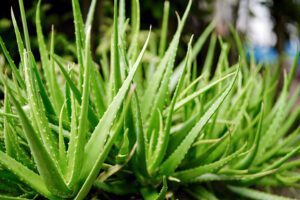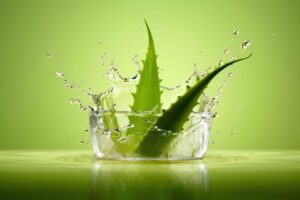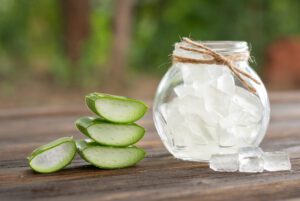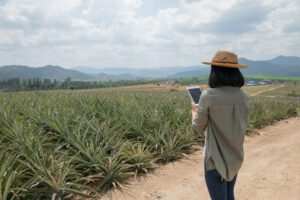Introduction
Aloe Vera, a succulent plant renowned for its versatile characteristics, has been highly esteemed in various cultures for countless years. This concise overview will explore the historical origins, botanical attributes, therapeutic applications, and industrial significance of the subject.
Aloe Vera, a hardy plant with a storied past, carries importance in both traditional medicine and contemporary industry. The wide range of applications for this resource, from skincare to agriculture, makes it highly valuable. [1]
1. Historical Background
Ancient civilizations have a complex story that is interwoven with the history of aloe vera. Aloe Vera originated in dry areas and rose to fame in cultures like ancient Egypt, where it was called the “Plant of Immortality.” Its application extended beyond skincare to include embalming procedures and religious ceremonies. Aloe Vera’s reputation grew throughout the Greek and Roman cultures as trade channels grew, and academics such as Dioscórides and Pliny the Elder began to document the plant. The plant made its way through Asian customs, where it was eventually used extensively in Ayurvedic treatment. Aloe Vera became a worldwide market when it was incorporated into European botanical gardens throughout the medieval and Renaissance periods. Later, it was brought to the Americas by Spanish explorers, where native populations welcomed its healing qualities. [1]
2. Botanical Characteristics
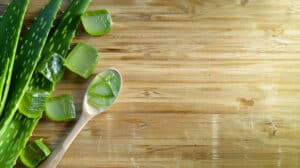
Aloe vera is a hardy succulent perennial with unique botanical features. Its lance-shaped, sharply edged leaves form a rosette and hold a clear gel that is packed with essential nutrients. This gel contains a wealth of vitamins, minerals, amino acids, and enzymes, which is where aloe vera gets its healing qualities. The plant exhibits versatility as it can flourish in arid environments thanks to its water-retaining leaves. Because of its cultivation-related toughness, aloe vera is adaptable to growing both indoors and outdoors. Aloe Vera’s unique look is a result of these botanical characteristics, which also support the plant’s many uses in traditional medicine, nutrition, and skincare. [1]
Also read: Botanical Extracts
3. ALOIN- Active component
The plant’s latex layer contains a naturally occurring compound called aloin, which is the active ingredient in aloe vera. It is known for its potent laxative effects and is often used for its gastrointestinal benefits. The purgative effects of some aloe vera products are attributed to aloin, which has a bitter taste. It’s important to remember that aloin content plays a part in the plant’s medicinal qualities, commercial aloe vera products meant for internal consumption frequently go through processing to meet safety regulations. [2]
4. Medicinal Properties
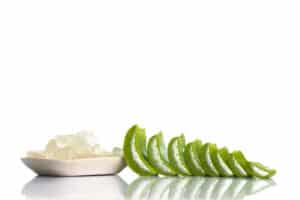
The therapeutic benefits of aloe vera are numerous and well-known. Because of its anti-inflammatory and cell-regenerating properties, its gel is well known for speeding the healing of wounds. Aloe Vera also soothes stomach problems and supports digestion. Its usefulness also extends to skincare, where its moisturizing and anti-aging properties are used. Aloe Vera is a powerful source of vitamins and antioxidants. Because of its medicinal properties, it is used in both ancient medicine and the creation of contemporary cosmetics and wellness products. [3]
Also Read: ESSENTIAL OIL EXTRACTION METHODS
5. Aloe Vera in Skincare

Aloe Vera’s inherent moisturizing and restorative properties make it a popular ingredient in skincare products. Its gel moisturizes skin without blocking pores because it is full of vitamins, minerals, and antioxidants. Aloe Vera, well-known for its anti-inflammatory qualities, relieves pain and speeds up the healing process, which makes it useful in the treatment of acne, sunburns, and other skin issues. Aloe Vera’s mild and nourishing properties make it a popular ingredient in skincare products, ranging from gels to creams, offering a comprehensive approach to preserving skin health and beauty. [4]
6. Nutritional Value
Aloe Vera has a high nutritional value and provides a range of necessary nutrients. Rich in vitamins A, C, and E, the gel inside its succulent leaves supports the immune system and general health. Moreover, aloe vera includes minerals like zinc and magnesium, which are essential for several body processes. Aloe Vera offers a natural and nutrient-rich boost when taken as a supplement or mixed into drinks. Its adaptability is enhanced by its nutritional richness, which makes it a beneficial dietary complement for people who want to live a healthier lifestyle. [1]
7. Aloe Vera in Agriculture
Beyond being used for personal hygiene, aloe vera supports sustainable farming methods and healthy soil. Aloe Vera is well known for improving soil quality and for being an environmentally friendly fertilizer that encourages plant development. It is appropriate for a variety of climates due to its durability and adaptability. Incorporating Aloe Vera into agricultural practices allows farmers to take advantage of the plant’s natural benefits while also supporting environmentally conscious production, which is in line with a more sustainable and environmentally friendly method of farming. [1]
8. Cultivation and Harvesting
Cultivating and harvesting Aloe Vera requires a nuanced approach to preserve its beneficial properties. Successful cultivation involves providing well-drained soil and adequate sunlight while avoiding waterlogged conditions. Harvesting requires careful timing and precision to extract the gel-filled leaves without damaging the plant. Aloe Vera’s resilience allows for both indoor and outdoor cultivation, making it adaptable to various environments. By understanding the plant’s needs and employing proper harvesting techniques, cultivators ensure the sustainability of Aloe Vera’s valuable and versatile properties.
9. Potential Side Effects

Aloe Vera is typically safe, but for certain people, it may have negative consequences. Even though they are uncommon, allergic reactions can happen and call for a patch test, particularly in people with sensitive skin. Because of substances like Aloin, aloe vera can have laxative effects when ingested. Following the suggested dosage amounts is essential because taking too much of it can cause discomfort in the digestive system. It is best to speak with medical professionals to ensure a safe and positive experience when using aloe vera in cosmetics or food regimens. [1]
10. Research and Studies
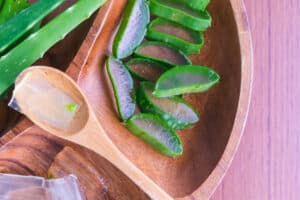
Studies and research are still being conducted to discover new aspects of aloe vera’s potential. Scientific research highlights Aloe Vera’s potential for wound healing and its anti-inflammatory qualities, solidifying its status as a major player in medicine and cosmetics. Our knowledge of the plant’s bioactive substances and how they affect many facets of health is strengthened by these investigations. Aloe Vera’s prospective uses in a variety of industries, including medicine and cosmetics, are becoming more and more clear as the study goes on, which is encouraging people to keep using and researching this amazing plant. [1]
11. Aloe Vera in Cosmetics
Because of its inherent benefits for skincare, aloe vera has gained significant traction in the cosmetics sector. It is a sought-after component in many cosmetic compositions due to its calming and restorative properties. Aloe Vera improves the efficacy of skin care products, from moisturizers to sunburn cure remedies. Its anti-inflammatory qualities and adaptability to various skin types add to its appeal. Aloe Vera remains a key ingredient in the creation of cosmetics for wellness and beauty as customers look for natural and skin-friendly alternatives. [1]
13. Environmental Impact
As the demand for aloe vera grows, it is imperative to comprehend the environmental impact of its growth. An industry can become greener by implementing sustainable practices, such as eco-friendly production techniques and ethical sourcing. Customers can contribute to the promotion of ecologically sustainable cultivation by selecting Aloe Vera products from providers who share their concerns. When combined with sustainable practices, the plant’s resilience and adaptation can reduce its environmental impact. Aloe Vera is a viable and environmentally beneficial resource for a variety of sectors when it is grown with consideration for the preservation of ecosystems. [5]
Conclusion
In summary, aloe vera is a unique natural resource because of its versatility, long history, and array of beneficial qualities. The continuing significance of this succulent plant is shown in its journey from ancient rituals to modern cosmetics. Its continued significance in medicine, agriculture, and cosmetics is guaranteed by its botanical richness and continuous research.It offers a wide range of benefits that are beneficial to all cultures and industries, making it a symbol of nature’s inventiveness.
Commonly Requested Questions:
- Is aloe vera suitable for every type of skin? Aloe Vera is typically harmless, however before using it extensively, people with sensitive skin should conduct a patch test15.
- Can one consume aloe vera on a daily basis? Although aloe vera supplements are available, it is best to speak with a healthcare provider before taking aloe vera on a regular basis.
- Are there any documented drug interactions? Aloe Vera and certain drugs may interact; if you have any questions, speak with your doctor.
- Is growing aloe vera environmentally friendly? Aloe vera can be grown sustainably, and buying products from suppliers you can trust helps protect the environment.
- Where can I locate high-quality Aloe Vera products? A range of Aloe Vera products are available from reputable health stores and internet merchants. Verify if the product satisfies quality requirements and is certified.




